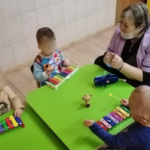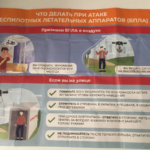Regarding the recognition of Ichkeria and the rights of self-determination of the peoples of the Russian Federation, or Do not feed the hungry, but give him a bait

Here is a view from Kuban on the problem of recognizing (and gaining) independence, which is becoming more and more acute for our republics. Here’s what Crimson Klin says about it.
Let us explain to you what the two acts recently adopted by Verkhovna Rada of Ukraine mean.
Undoubtedly, everyone guessed about the recognition of the occupation of independent Ichkeria by Ukraine and about the act of recognizing the rights of the occupied peoples of the Russian Federation to self-determination that came out a few days earlier.
Both acts caused a considerable amount of talk even in the circles of independents from different regions of the Russian Federation. Especially a lot of talk and hesitation was around the recognition of the independence of Ichkeria, the genocide of its population by Russia and the fact of the occupation of Ichkeria by the Russian Federation.
Doubts arose in the public discourse of regionalists: what does the recognition of only single Ichkeria mean? Is this a sign that international recognition shines at the moment for only one state and it is worth relaxing, or is it, on the contrary, a signal to act in order to confirm the same right to be recognized? What is the status of other territories and peoples of the Russian Federation, which are already beginning to move towards self-determination and split from Moscow platform?
Let’s break down some things. After 1991, during the 1990s and the beginning of the 2000s, a number of regions of the Russian Federation began to move towards the creation or revival of their statehood.
Tatarstan came close to the revival of its statehood. In fact, Mintimer Shaimiev, President of Tatarstan in 1991-2010, initially advocated independence from Moscow. Everyone knows the example of the Ural People’s Republic, which even managed to acquire its own currency. At the time, Alexander Tkachev also spoke from the standpoint of at least increased autonomy and the revival of Kuban culture in the late 90s and early 2000s, who rather quickly descended to the level of a cross between a satrap, a gauleiter and a local magnate in the worst traditions of Moscow nobility. In a word, there were quite a few movements and sometimes – in larger and more populous areas of Ichkeria. We do not consider in this case the independence movements that raged a hundred years ago, like, for example, the KuPR, we are talking about relatively recent times.
And in this relatively recent retrospective, it is clearly visible that of all these movements and formations, only Ichkeria turns out to be a formation that at a certain moment, namely after the Khasavyurt agreements of 1996, practically officially existed for some time as a state separate from the Russian Federation. And most importantly: for 15 years, Ichkeria shed its blood, destroyed and terrified the invaders, and even after the war had already taken on a completely destructive character, the Chechens did not give up, creating problems for the Russian authorities and reminding of themselves for a very long time.
In fact, the resistance was reduced to nothing not due to the military victories of the Russian Federation, but due to the betrayal committed by Kadyrovs.
And just these two factors give Ichkeria its full right to recognition. In a recent historical retrospective, it has proved and paid for its future independence with blood. Many of the participants in those events are alive, many are participating in the war in Ukraine against the same enemies as in the 90s and 2000s.
But, alas, now among us there are no those who would remember Nikolai Ryabovol, Luka Bych, Hadji-Berzek Kerantukh and other heroes who at different times fought for the freedom of the Kuban, Circassians and other peoples of the Kuban. The situation is similar with witnesses of independent movements in other regions of the Russian Federation. Ichkeria has already proved its will to freedom. We all have yet to prove it, and we are still at the beginning of the journey.
Now let’s come close to the question of self-determination of the peoples of Russia. This document was adopted a few days before the recognition of Ichkeria. Well, the right of the peoples of the Russian Federation is now receiving official recognition and official support. This is a very good symbolic step. However, this symbolic step, certainly deserving gratitude and the highest appreciation, will not liberate either Ichkeria, or the Kuban, or other regions of the Russian Federation. This can only be done by the peoples who inhabit these regions, including diasporas abroad.
Once, when in the Latvian Seimas deputy Janis Dombrava spoke out in defense of the rights to self-determination of the peoples of Yakutia and Chechnya, we turned to him with a request to announce something about the Kuban and received a clear answer, “Latvia knows what it means to be under Russian-Soviet occupation.
The impulse of independence should come from within, not from outside. When the will of a nation is strong enough for the people to create or rebuild their own state, other nations will see this and provide the necessary support.”
There is nothing to add or to subtract from what has been said.
Therefore, the recognition of both the sovereignty of Ichkeria and the right of the peoples of the Russian Federation to self-determination is a symbolic, although not a very important step, but not a panacea. Nobody will do it for us.
Symbolic acts should confirm the victories of the Armed Forces of Ukraine on the battlefields, but also the actions of the peoples of the Russian Federation to achieve independence.
That is why both acts are a signal to double, triple and tenfold efforts to break away from the Muscovite empire and achieve independence.
For the Kuban in the first place.


Leave a Reply